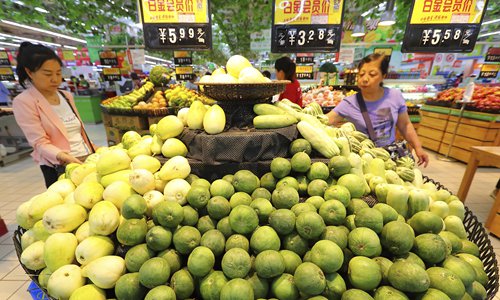HOME >> BUSINESS
Moderate CPI leaves scope for monetary response
By Wang Cong Source:Global Times Published: 2019/6/12 21:58:40
Fundamentals remain solid in face of risks: analysts

Customers select fruit at a supermarket in Taiyuan, North China's Shanxi Province on Wednesday. Photo: VCG
Consumer inflation in China posted relatively moderate growth in May, despite a significant surge in food prices, leaving sufficient room for monetary policy maneuvers as the country battles risks of slowing domestic growth and escalating trade tensions with the US, analysts said on Wednesday.
As the consumer price index (CPI) remains well below this year's target and the US continues to threaten more tariffs on Chinese goods, Chinese policymakers are likely to pursue a more relaxed monetary policy and more proactive fiscal policy to help the economy, analysts noted.
In May, China's CPI further picked up pace and rose 2.7 percent year-on-year, the highest level in 15 months, according to data from the National Bureau of Statistics (NBS) released on Wednesday. The increase was largely fueled by a 7.7 percent gain in food prices, particularly a 26.7 percent rise in fresh fruit prices due to weather-related factors and an 18.2 percent gain in pork prices due to outbreaks of African swine fever.
"Though the CPI increased for a third consecutive month, the overall rate of growth remains relatively moderate and does not constitute a constraint on monetary policy," Liu Xuezhi, an economist at Bank of Communications, told the Global Times.
Noting that the growth rate in May was well below the 3 percent annual target set by policy-makers, Liu suggested that the central bank could continue to adopt policies that are "slightly on the loosening side" to cope with rising risks.
The People's Bank of China (PBC), the central bank, has maintained a prudent monetary policy, providing sufficient liquidity through targeted cuts to required reserve ratios, or cash banks must set aside as reserves, while also trying to fend off financial risks.
In May, broad M2 money supply grew by 8.5 percent year-on-year, unchanged from that in April, according to data released by the PBC Wednesday. New yuan-denominated loans reached 1.18 trillion yuan ($170.65 billion) in the month, slightly lower than the 1.3 trillion yuan expected.
Tackling trade risks
But as the US continues to escalate its trade war with China, PBC officials have recently hinted that they would take necessary steps to cope with potential risks.
When attending meetings of finance ministers and central bank chiefs from the G20 countries in Japan over the weekend, PBC Governor Yi Gang said that China's macro policy still has sufficient room and tools to deal with "various uncertainties."
One uncertainty is whether the US will follow through a threat to impose duties on all remaining Chinese exports to the US. US President Donald Trump has repeatedly threatened to slap tariffs on $300 billion worth of Chinese goods, if Chinese President Xi Jinping does not agree to meet with him at the G20 summit in Japan later this month.
Chinese officials have not disclosed plans for such a meeting and have been harshly criticizing the US for bullying tactics in trade that put not just the two countries' economies but the world economy as a whole at risk. Officials have also vowed to take countermeasures should the US take more action.
Though facing persistent downward pressure, the Chinese economy remains resilient to deal with the impact of US tariffs, said Cao Heping, an economics professor at Peking University, noting that China will be able to keep economic growth at home stable.
"Yes, there is pressure in some areas, but the structure of the Chinese economy has improved significantly and there are many policy tools China can use to help stabilize growth," said Cao, pointing to a thriving digital economy and a massive domestic market.
While tariffs will bring more pressure to the already slowing Chinese economy, they will also hurt US consumers and the economy, which has also shown weakening signs and indications that a recession might even be imminent, analysts said.
"As long as we maintain stable growth in domestic demand and employment through targeted measures," China's economy will be able to bear the pressure from the US, Liu said.
Posted in: ECONOMY